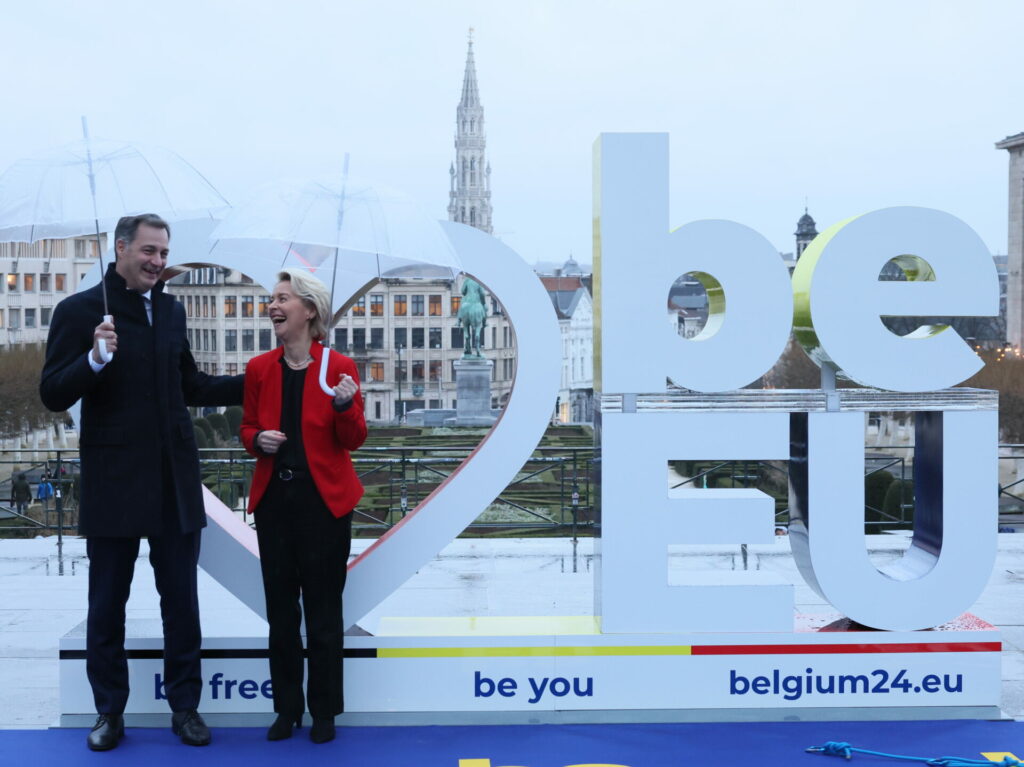The first major event of the 6-month Belgian Presidency of the Council of the European Union kicked off on Friday afternoon with a visit from the EU College of Commissioners.
The biannual tradition was originally intended as a day-long event, but the inauguration was reduced to Friday afternoon due to tributes for the death of Jacques Delors in Paris in the morning. A cornerstone of modern Europe, the Belgian Presidency's ceremonial beginning was profoundly marked by Delors' passing.
The European Commission met with Belgian Prime Minister Alexander De Croo, Minister of Foreign Affairs Hadja Lahbib, and officials from the Federal Government at Egmont Palace at 14:30, where Belgium's presidential priorities and the EU's strategy for 2024 to 2029 were discussed.
Looking forward to partnering with @alexanderdecroo in this crucial presidency.
It's essential to conclude as many files as possible. We discussed the revision of the EU’s multiannual budget, in particular to support Ukraine in the long-term. pic.twitter.com/0f0yH9EiFI — Ursula von der Leyen (@vonderleyen) January 5, 2024
Talks were followed by an official opening ceremony at the Royal Museum of Fine Arts (Bozar), where Commission President Ursula Von Der Leyen gave a speech commemorating Delors.
King Philippe, Queen Mathilde and other notable international figures were present, and music at Henry Le Boeuf hall afterwards was provided by an array of Belgian artists – including violinist Lorenzo Gatto and singers Selah Sue and Charlotte Adigéry.
"This event, organised in collaboration with communities and regions, aims to highlight Belgium's openness to innovation, cooperation and diversity," the government stated.
Presidential priorities
For Belgium's thirteenth stint at the helm of the Council of the European Union, the country has placed the rule of law, competitiveness, ecological transition, the social agenda, asylum and migration, and foreign policy at the top of the agenda.
Belgium has the additional responsibility of determining the political priorities of the next EU legislature, given that this is the final presidency of the current mandate.
The Council represents the intergovernmental aspect of the EU's day-to-day decision-making process. It determines EU foreign policy and budget decisions and concludes international agreements. It is not to be confused with the European Council – responsible for determining broader EU strategy – or the the Council of Europe, a non-EU body focusing on human rights.
Inauguration de la Présidence 🇧🇪 du Conseil de l’UE
Départ des membres du collège des commissaires @EU_Commission pour le Palais d’Egmont, dans un bus 🚌 @STIBMIVB électrique soutenu par le plan de relance 🇪🇺#EU2024BE #NextGenerationEU #EUGreenDeal 1. pic.twitter.com/xTJRuIv9Eu — EU Commissie in België / Commission UE en Belgique (@EU4BE) January 5, 2024
The EU College of Commissioners travelled to Egmont Palace in an electric STIB bus.
The upcoming European elections in June have a large influence on how Belgian decision-makers will approach the rotating presidency.
"As holders of the presidency, we will be required to fulfil a dual role. Firstly, to finalise as many legislative dossiers as possible. And secondly, to prepare for the future," said Hahbib. "We are keen to make this presidency a collective success – for Belgium, for Europe and with regard to the impact it will have on the world and on our citizens."

